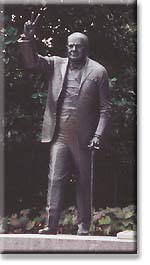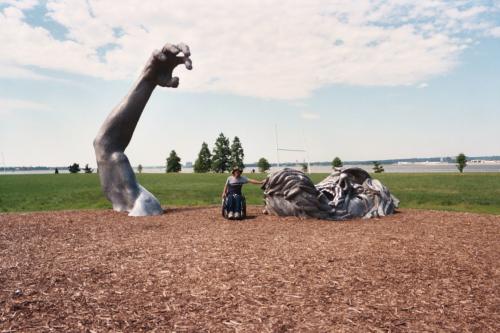I just got around to listening to last week’s episode of Off The Hook, the hacker radio show affiliated with 2600: The Hacker Quarterly, and heard something pretty interesting about the current mess with Valorie Plame, Karl Rove, et al. They played a brief clip from a presentation given by a Robert Steele almost exactly one year ago at the Fifth Hope hacker conference in New York City.
I don’t normally write anything about US politics, and I’m not even going to offer any comments this, aside from the fact that it’s kind of cool. However, I did attend this same conference in the year 2000, where I actually met Robert Steele, so let’s just say this falls under my blanket mission of writing about places where I’ve been.
The July 13, 2005 episode of Off The Hook can be downloaded in mp3 form from their web site. The following transript begins 40 minutes into the show.
Bernie S: You mentioned a while ago the need for a national traitor intelligence system. On that subject, what’s your take on the whole Valeie Plame outing, and who do you think did it?
Robert Steele: I think Scooter Libby in Dick Cheney’s office did it with Karl Rove’s explicit approval and Dick Cheney’s explicit concealment after the fact.
Bernie S: What are your feelings on it?
Robert Steele: I think it has the potential to be Al Capone’s tax return. It really does.
Bernie S: Do you think that this will ever be- where do you think this investigation will lead, regardless of who’s found to have done it?
Robert Steele: Well, part of our problem is that the Republicans control both houses of Congress and the moderate Republicans are being intimidated by the extremist Republicans and the people haven’t spoken. Right now the people don’t care about Valorie Plame’s outing. Inasumch as the vice presiden’t office, in my humble opinion, very flagrantly and deliberately violated a national law, I would like to see them brought to justice. i would like to see Dick Cheney brought to justice for sole-sourcing billions of dollars to Haliburton. you know these guys are bending or breaking every rule they can find. and the outing of Valorie Plame is i think one of the things that George Tenet simply had to be honest about and it let to his eventual resignation.
The man asking the questions is Bernie S, co-host of Off The Hook. Here is his official mini-bio from The Fifth Hope conference web page.
Bernie S. has been hacking computers, phones, radios, and the authorities for over 25 years – sometimes pushing the envelope too far. In 1995 he was imprisoned for one and a half years by the Secret Service for possessing hardware and software they said had the potential for abuse. Later the U.S. government admitted “there were no victims in the offense” and that they were more concerned about his exposing their covert activities. Bernie continues to investigate and report on communications technologies and government activities.
The man giving the talk is Robert Steele. His bio from the same web site reads:
Robert Steele is the author of On Intelligence: Spies and Secrecy in an Open World and The New Craft of Intelligence: Personal, Public, & Political. He is the founder and CEO of OSS.Net, a global intelligence partnership and network that excels at both teaching and performing legal ethical intelligence collection, processing, and analysis. In the course of a 25 year national security career, Robert has served as a Marine Corps infantry officer and service level plans officer; fulfilled clandestine, covert action, and technical collection duties; been responsible for programming funds for overhead reconnaissance capabilities; contributed to strategic signals intelligence operations; managed an offensive counterintelligence program; initiated an advanced information technology project; and been the senior civilian responsible for founding a new national intelligence production facility. He was one of the first clandestine officers assigned the terrorist target on a full time basis in the 1980s and the first person, also in the 1980s, to devise advanced information technology applications relevant to clandestine operations.
Robert Steele’s web page is here.
Robert Steele’s entire presentation, from The Fifth Hope conference, along with those of every other speaker (and there is some great stuff in there), can be found in mp3 format on the web. His presentation is entitled “Everything You Ever Wanted to Know About Spying, 9-11, and Why We Continue to Screw Up” and is well worth a listen.







